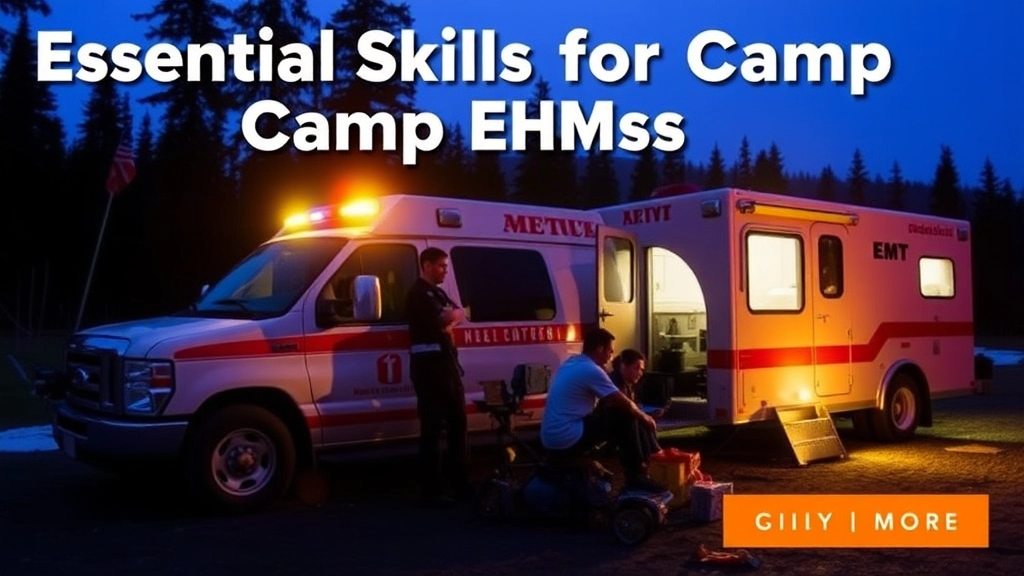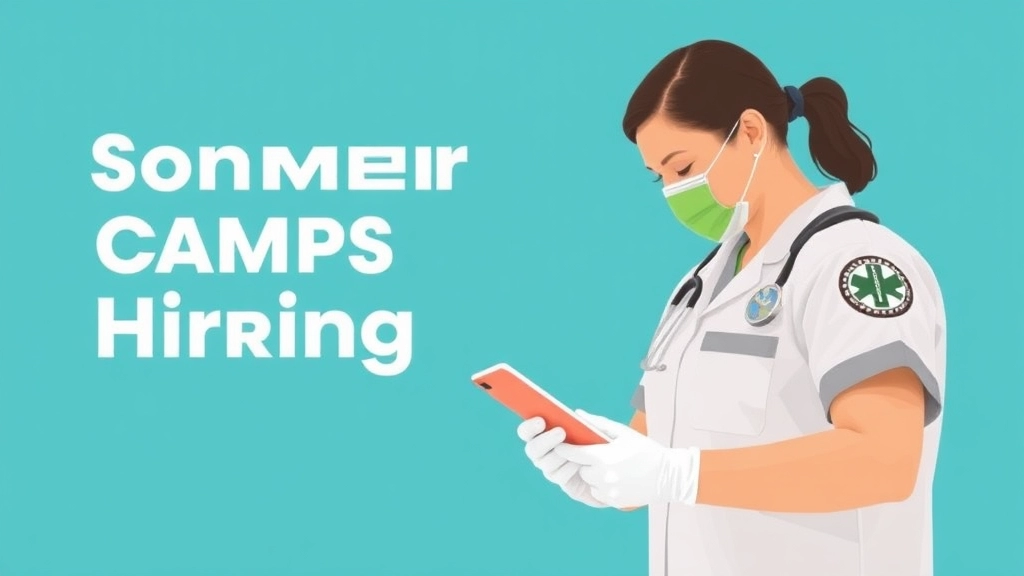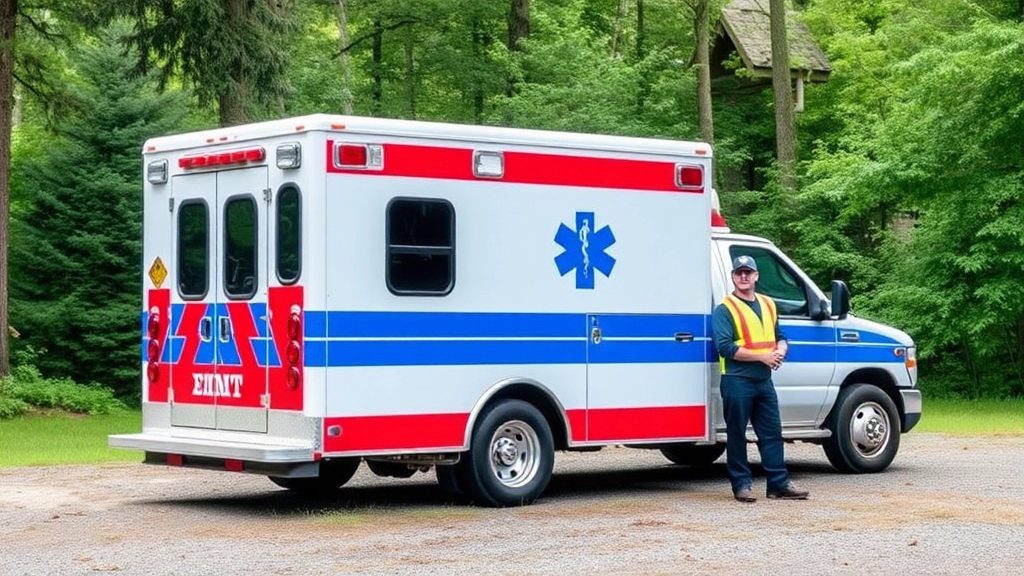Summer Camp EMT Role
If you’re passionate about providing medical care and ensuring the safety of campers, a Summer Camp EMT role might be perfect for you. As a Summer Camp EMT, your key responsibilities include handling emergencies, administering first aid, and ensuring overall camp safety. This role is crucial, especially during outdoor activities where the risk of injuries is higher.
Key Responsibilities
- Handling emergencies
- Administering first aid
- Ensuring overall camp safety
Required Skills and Certifications
Being a Summer Camp EMT requires specific skills and certifications. You’ll need to be quick-thinking, calm under pressure, and have a valid EMT certification.
Benefits of the Role
Working in this role offers numerous benefits, from gaining valuable experience in emergency response to enjoying the vibrant camp environment. If you’re looking to make a difference while enjoying the summer, this could be the ideal job for you.
Key Responsibilities of a Summer Camp EMT
Alright, let’s get straight into it. What really goes down when you’re the EMT at a summer camp? If you’re considering this gig, you’re probably wondering, “What am I actually signing up for?” Well, let’s break it down.
Immediate Medical Response
First and foremost, your main job is to be the first responder. When a kid scrapes a knee, gets stung by a bee, or worse, it’s you who jumps into action. You need to be quick on your feet and ready to handle anything from minor cuts to more serious injuries like fractures.
Daily Health Checks
Next up, daily health checks. This might sound mundane, but it’s crucial. Every morning, you’ll be doing rounds, checking in on campers who might be feeling a bit off. It’s about catching anything before it becomes a bigger issue.
Medication Management
Then there’s medication management. Some kids come to camp with prescribed meds. It’s your job to make sure they take them on time. Think of it like being a human alarm clock but with more responsibility.
Health Records and Documentation
Don’t forget about keeping health records. Every interaction, every treatment, every medication given needs to be logged. It’s not just about covering your backâit’s about making sure there’s a trail of what’s been done, just in case.
Emergency Drills
And let’s not overlook emergency drills. Camps usually have protocols for fires, severe weather, and other emergencies. You’ll be involved in planning and executing these drills to make sure everyone knows what to do when things go south.
Parental Communication
Lastly, there’s communicating with parents. When a kid gets hurt, parents want to know. You’ll need to be able to explain what happened and what steps you took to make sure their child is okay.
Real Talk: The Unseen Duties
Now, let’s get real. There are a bunch of things that might not be in the job description but are part of the gig.
- Counselling: Sometimes, kids just need someone to talk to. You might find yourself playing the role of a counsellor.
- Team Player: You’re part of a bigger team. Expect to help out with non-medical tasks when needed.
- Adaptability: Camps are unpredictable. One minute you’re dealing with a sprained ankle, the next you’re helping with a campfire.
So, if you’re thinking about becoming a summer camp EMT, know that you’re signing up for a role that’s as diverse as it is demanding. But, trust me, it’s also incredibly rewarding. You get to be the hero of the camp, the one who keeps everyone safe and sound. And that, my friend, is priceless.
For more insights on how to prepare for your role, check out our Summer Camp Counselor Resume Tips and Tricks and make sure you’re fully equipped with our Ultimate Packing Checklist for Summer Camp.
Essential Skills for Camp EMTs

Ever wondered what it takes to be a top-notch camp EMT?
Let’s break it down.
First Aid and CPR Mastery
Every second counts in an emergency. You need to be a whiz at first aid and CPR. Kids get scrapes, cuts, and bruises all the time. And sometimes, it’s more serious. Knowing how to react fast can make all the difference.
Communication Skills
Ever tried calming a scared kid? It’s not easy. You need to talk to children and adults alike. Explain injuries, treatments, and safety measures clearly. And sometimes, you’ve got to communicate with parents over the phone. Be clear, be concise, and be comforting.
Quick Decision-Making
Imagine a kid falls off a climbing wall. You’ve got to decide what to do in a heartbeat. Assess the situation. Make quick, informed decisions. Your choices can impact the child’s recovery.
Stamina and Physical Fitness
Running around the camp all day? It’s a workout. You need to be in good shape. Lift, carry, and sometimes even run with medical gear. Stamina is key.
Attention to Detail
Ever missed a small detail? In a medical setting, that can be huge. You need to notice everything. From symptoms to changes in a child’s condition. Details matter.
Empathy and Patience
Kids can be scared and in pain. Parents can be anxious. You need to show empathy and patience. It’s not just about medical skills. It’s about being there for them emotionally too.
Organisational Skills
Keeping track of medical supplies? Managing health records? It’s all part of the job. You need to be organised. A well-stocked first aid kit can save lives.
Adaptability
Camp environments are unpredictable. Weather changes, activities vary. You need to adapt to different situations. Be flexible and ready for anything.
Real Talk
Imagine you’re at a campfire. A kid suddenly feels dizzy. You need to act. Quickly assess, communicate, and treat. That’s the life of a camp EMT.
So, if you’re thinking about becoming a camp EMT, make sure you’ve got these skills down pat. They’ll not only make your job easier but also ensure the safety and well-being of everyone at camp.
Benefits of Working as a Summer Camp EMT
Thinking about becoming a Summer Camp EMT? You’re not alone. Many folks wonder if it’s worth trading their regular gig for a summer adventure. Let’s dive into why this role might just be the best thing you’ll ever do.
Real-World Experience
First off, working as a Summer Camp EMT gives you hands-on, real-world experience that’s hard to beat. You’re not just dealing with routine calls; you’re handling everything from minor scrapes to serious emergencies. This diverse experience can be a massive boost to your skill set.
Networking Opportunities
Another perk? Networking opportunities. Camps often have a mix of staff from various backgrounds. You might find yourself rubbing elbows with doctors, nurses, and other healthcare professionals. These connections could be invaluable for your career down the line.
Personal Growth and Fulfillment
Let’s talk about personal growth. Working at a camp pushes you out of your comfort zone. You’re in a new environment, dealing with new challenges. It’s a fast track to becoming more adaptable and resilient. Plus, the fulfillment you get from helping kids and staff can be incredibly rewarding.
Work-Life Balance
Ever felt like your regular EMT job is eating up your life? At a summer camp, you often get a better work-life balance. Sure, the hours can be long, but there’s usually downtime to enjoy the great outdoors, make new friends, and even pick up new hobbies.
Financial Perks
While it’s not always about the money, let’s not ignore the financial perks. Some camps offer competitive pay, and you often get room and board included. That means you can save a good chunk of your earnings.
Stories and Examples
I remember my first summer camp gig. One day, a camper fell and hurt his ankle. It wasn’t serious, but he was scared. I helped him calm down, treated his injury, and by the end of the week, he was back to running around. The gratitude from him and his parents was worth more than any paycheck.
Bullet Points for Quick Skimming
- Hands-on Experience: Diverse medical situations to handle.
- Networking: Meet healthcare professionals.
- Personal Growth: Adaptability and resilience.
- Work-Life Balance: Time to relax and enjoy.
- Financial Perks: Competitive pay with room and board.
If you’re interested in learning more about different camp experiences, check out our Taekwondo Summer Camp Ultimate Guide for Parents and discover the joys of summer camp through poetry.
Certification and Training Requirements

Alright, let’s cut to the chase.
You want to be a Summer Camp EMT, but you’re wondering, “What kind of certification and training do I need?”
You’re in the right place.
What’s Needed?
First off, you need to be a certified EMT.
Here’s the lowdown:
- Basic EMT Certification: You can’t skip this. It’s the foundation.
- CPR Certification: This one’s a no-brainer. Lives depend on it.
- First Aid Training: Camps love it when you have this extra bit of training.
How to Get Certified
Now, let’s talk about how you get these certifications.
- EMT Courses: You’ll need to complete an accredited EMT course. These usually take about 6 months.
- CPR Classes: Often bundled with your EMT course, but you can take standalone classes too.
- First Aid Training: Red Cross or similar organisations offer these.
Real Talk: Exams and Renewals
Once you’ve got your certifications, you’re not done yet.
- National Registry Exam: You need to pass this to be officially certified.
- State Exams: Some states have their own tests. Know your local requirements.
- Renewals: Every two years, you’ve got to renew your certifications. No slacking here.
Extra Training for Camps
Summer camps have their own set of challenges.
You might need:
- Wilderness First Aid: Camps in remote areas often require this.
- Pediatric Training: Kids are a different ball game. Know how to handle them.
Stories from the Field
I remember my first camp job.
I thought I was ready, but the wilderness training I took was a game-changer.
We had a kid with a severe allergic reaction miles from the nearest hospital.
Thanks to that extra training, I knew exactly what to do.
Quick Recap
- Get your Basic EMT Certification.
- Don’t forget CPR and First Aid.
- Pass your National and State Exams.
- Renew every two years.
- Consider extra training like Wilderness First Aid and Pediatric Training.
If you’re serious about being a Summer Camp EMT, you need to get these certifications and training under your belt.
No fluff, no shortcuts.
Just solid, essential training.
Challenges Faced by EMTs in Camp Environments
Ever wondered what it’s really like to be an EMT at a summer camp? Trust me, it’s not all sunshine and marshmallows. Let’s dive into the nitty-gritty of the challenges faced by EMTs in camp environments.
Unpredictable Medical Emergencies
First off, the keyword here is “unpredictable.” Unlike a hospital setting where you have a pretty good idea of what might come through the door, camps are a mixed bag. One minute, you’re treating a scraped knee; the next, you’re handling a severe allergic reaction. You need to be ready for anything.
Limited Resources
Out in the wilderness, you don’t have the luxury of a fully stocked ER. Supplies can be limited, and you might have to improvise. Sometimes, it’s about making the best out of what you’ve got.
Weather Conditions
Mother Nature is another unpredictable factor. Whether it’s scorching heat, sudden downpours, or even unexpected cold snaps, the weather can make your job a lot harder. Heatstroke, hypothermia, and dehydration are just a few of the weather-related issues you might have to deal with.
Remote Locations
Most camps are located in remote areas, far from the nearest hospital. This means that in case of a severe emergency, you have to stabilise the patient and wait for an airlift or a long ambulance ride. The waiting game can be nerve-wracking.
High Activity Levels
Kids at camp are always on the goâswimming, hiking, climbing, you name it. High activity levels mean a higher risk of injuries. Sprains, fractures, and cuts are common, and you need to be quick on your feet to handle them.
Emotional Stress
Let’s not forget the emotional toll. Dealing with injured or sick children can be stressful, especially when they’re scared and away from their parents. You have to be a comforting presence while also doing your job efficiently.
Communication Barriers
Kids might not always be able to articulate what’s wrong, making diagnosis tricky. Plus, if you’re dealing with campers from different backgrounds, language barriers can add another layer of complexity.
Night Shifts
Camps run 24/7, and so do the medical needs. Night shifts can be particularly challenging. You’re dealing with fatigue, reduced visibility, and the eerie quiet of the woods, all while staying alert for any emergencies.
Team Dynamics
Working in a camp means you’re part of a team that includes counsellors, activity leaders, and other staff. Sometimes, there can be a lack of clear communication or differing opinions on how to handle a situation. Navigating these dynamics is crucial.
Real Stories from the Field
Let me share a quick story. I remember one summer when a camper had a severe asthma attack during a hiking trip. We were miles away from the main camp, and our inhaler supply was limited. We had to think on our feet, using every bit of our training to keep the camper stable until we could get them back to the main medical facility. It was a nerve-wracking experience but also a testament to the importance of being prepared for anything.
Tips for Overcoming Challenges
- Stay Prepared: Always have a well-stocked first aid kit and know your surroundings.
- Stay Calm: In emergencies, a calm demeanour can help soothe anxious campers.
- Stay Informed: Keep up-to-date with the latest medical protocols and camp safety procedures.
- Stay Connected: Build strong communication lines with camp staff and local emergency services.
Popular Summer Camps Hiring EMTs

Ever wondered where you can put your EMT skills to good use during the summer?
Let’s talk about the most popular summer camps hiring EMTs.
You’ll get to help kids, enjoy the great outdoors, and make some cash.
1. Camp America
This one’s a classic.
Camp America is always on the lookout for qualified EMTs.
They have camps all over the U.S., so you get to pick a location you like.
Plus, you get to meet people from all over the world.
2. YMCA Camps
YMCA camps are everywhere.
They offer a variety of programs, from sports to arts and crafts.
And they need EMTs to keep everyone safe.
It’s a great way to get some experience and make a difference.
3. Boy Scouts of America
If you love adventure, this is for you.
Boy Scouts camps are all about outdoor activities.
Hiking, canoeing, you name it.
And they need EMTs to handle any medical issues that come up.
4. Girl Scouts of the USA
Similar to the Boy Scouts, but for girls.
Girl Scouts camps focus on building skills and confidence.
As an EMT, you’ll be a crucial part of their team.
5. Private Camps
Don’t forget about private camps.
These can be anything from sports camps to academic camps.
They often have higher budgets, which can mean better pay for you.
6. Special Needs Camps
These camps are incredibly rewarding.
You’ll be working with kids who have various needs, from physical disabilities to emotional challenges.
Your EMT skills will be invaluable here.
Why These Camps?
These camps are popular for a reason.
They offer a mix of fun and responsibility.
And they value the role of EMTs.
How to Get Hired
Wondering how to land a job at one of these camps?
Here are some tips:
- Network: Talk to people who have worked at these camps before.
- Apply Early: These positions fill up fast.
- Show Experience: Highlight any previous camp or EMT experience you have.
- Be Flexible: The more flexible you are with your availability, the better your chances.
Tips for Landing a Summer Camp EMT Job
So, you’re thinking about landing a summer camp EMT job, huh? I get it. You’re probably wondering, “How do I stand out?” “What do they really want?” “Is it even worth it?” Let’s break it down, no fluff, just straight talk.
Know What Camps Are Looking For
First off, summer camps want someone who’s reliable and can think on their feet. They’re not just looking for any EMT; they want someone who’s calm under pressure and can handle kids.
- Experience with kids: If you’ve worked with children before, highlight it. Camps love that.
- Problem-solving skills: Be ready to share stories where you had to make quick decisions.
- Team player: Camps are all about community. Show that you can work well with others.
Beef Up Your CV
Your CV is your ticket in. Make sure it’s not just a list of jobs but a story of why you’re the perfect fit.
- Tailor your resume: Focus on relevant experience. If you’ve worked in high-pressure environments or have any wilderness training, mention it.
- Certifications: Make sure your EMT certification is up to date. If you have additional certifications like CPR or First Aid, flaunt them.
- References: Get solid references who can vouch for your skills and reliability.
Nail the Interview
Interviews can be nerve-wracking, but they don’t have to be. Treat it like a conversation. Camps want to know if you’re someone they can trust with their campers’ safety.
- Be prepared: Know the camp’s mission and values. Show them you’ve done your homework.
- Share stories: Have a few anecdotes ready about your experience. Real-life examples resonate more than hypothetical answers.
- Ask questions: Show your interest by asking about their protocols, team dynamics, and what a typical day looks like.
Network, Network, Network
Sometimes it’s not just what you know, but who you know. Get your name out there.
- Join EMT forums and groups: These can be gold mines for job postings and advice.
- Attend job fairs: Many camps recruit at fairs, especially those focused on medical or outdoor careers.
- Leverage social media: Follow camps on social media and engage with their posts. It’s a subtle way to get noticed.
Be Ready for the Unique Challenges
Working at a camp isn’t your typical EMT gig. Be ready for the unique challenges that come with the territory.
- Outdoor environment: You’ll be dealing with nature â think bee stings, poison ivy, and dehydration.
- Limited resources: You won’t have a hospital’s resources at your disposal. Be prepared to improvise.
- Emotional resilience: Kids can get scared easily. You need to be a calming presence.
Stay Updated
Finally, keep your skills sharp and stay updated on best practices.
- Continual learning: Take courses or attend workshops that can give you an edge.
- Stay fit: Physical fitness can be crucial, especially if you need to carry equipment or even a camper in an emergency.
Landing a summer camp EMT job isn’t rocket science, but it does require some strategy. Remember, you’re not just selling your skills â you’re selling your ability to keep kids safe and happy. So, make your application a reflection of that.
Seasonal vs. Full-Time EMT Positions at Camps

Ever wondered whether to go for a seasonal or full-time EMT gig at a summer camp?
You’re not alone.
Seasonal EMT Positions:
- Flexibility: Perfect if you’re a student or have another job. You get to enjoy the summer outdoors and then go back to your regular life.
- Short-Term Commitment: Usually lasts a few months. Great for testing the waters without a long-term obligation.
- Experience: You get a taste of the camp life and gain valuable experience. Ideal for building your resume.
Full-Time EMT Positions:
- Stability: If you crave job security, this is your jam. Full-time means you’re employed year-round.
- Deep Connections: You build stronger relationships with campers and staff. It’s like having a second family.
- Consistent Income: No more worrying about what happens when summer ends. You’ve got a steady paycheck.
Which One’s Right for You?
Think about your lifestyle and career goals.
- Need Flexibility? Go seasonal.
- Want Stability? Full-time is the way to go.
Real Talk:
I once met an EMT who started with a seasonal gig. She loved it so much she turned it into a full-time career. Now she’s the go-to person for all things health-related at her camp.
In a nutshell, both options have their perks.
It’s all about what fits your life best.
So, whether you’re dipping your toes in or diving deep, there’s a spot for you in the camp world.
Remember:
Your choice will shape your experience.
Safety Protocols in Summer Camps for EMTs
Ever thought about the safety protocols in summer camps for EMTs?
I know, it can be a bit nerve-wracking.
But trust me, it’s simpler than you think.
Why Are Safety Protocols So Crucial?
First off, let’s get real.
Kids are accident-prone.
And when they’re out in the wild, things can get messy.
So, safety protocols?
They’re your best mate.
They keep everyone safe and sound.
Key Safety Protocols You Need to Know
- Emergency Response Plan:
- Know it like the back of your hand.
- Quick response saves lives.
- First Aid Kits:
- Fully stocked and easily accessible.
- Check them regularly.
- Communication Systems:
- Radios, mobile phonesâwhatever works.
- Always stay connected.
- Training Drills:
- Regular practice keeps you sharp.
- Involve the whole camp staff.
Real-Life Example
Remember that time when Jamie sprained his ankle during a hike?
The emergency response plan kicked in.
First aid kit? Check.
Quick communication? Check.
Jamie was back on his feet in no time.
Tips for Staying Prepared
- Stay Updated: Medical guidelines change. Keep learning.
- Know the Terrain: Familiarise yourself with the camp layout.
- Build Rapport: Get to know the campers. It makes emergencies easier to handle.
Common Concerns
“What if I miss something?”
You won’t.
Protocols are there to guide you.
“What if the equipment fails?”
Have backups.
Always.
For more tips on ensuring a safe and fun summer camp experience, check out our guide on summer camp activities.
FAQs for Summer Camp EMTs
What skills are essential for a Camp EMT?
Being a Camp EMT requires a variety of skills including First Aid and CPR mastery, excellent communication skills, quick decision-making, stamina and physical fitness, attention to detail, empathy and patience, organizational skills, and adaptability.
What certifications and training do I need to become a Summer Camp EMT?
To become a Summer Camp EMT, you need to be a certified EMT. This includes obtaining a Basic EMT Certification, CPR Certification, and First Aid Training. Additionally, passing the National Registry Exam and any required State Exams is necessary. Certifications must be renewed every two years.
Are there any additional certifications that are beneficial for working at a camp?
Yes, additional certifications such as Wilderness First Aid and Pediatric Training can be highly beneficial, especially for camps in remote areas or those that primarily cater to children.
What are some popular summer camps that hire EMTs?
Popular summer camps that hire EMTs include Camp America, YMCA Camps, Boy Scouts of America, Girl Scouts of the USA, private camps, and special needs camps.
What is the difference between seasonal and full-time EMT positions at camps?
Seasonal EMT positions offer flexibility, a short-term commitment, and valuable experience. Full-time EMT positions provide stability, deep connections with campers and staff, and a consistent income. Your choice depends on your lifestyle and career goals.
How can I increase my chances of getting hired as a Camp EMT?
To increase your chances of getting hired, you should network with people who have worked at these camps, apply early, highlight your experience, and be flexible with your availability.
What kind of activities and environments can I expect at these camps?
You can expect a variety of activities and environments depending on the camp. These can range from outdoor adventures like hiking and canoeing at Boy Scouts camps to arts and crafts at YMCA camps. Special needs camps will have unique challenges and rewards, working with kids who have various needs.
Why is it important to have good organizational skills as a Camp EMT?
Good organizational skills are crucial for keeping track of medical supplies, managing health records, and ensuring that first aid kits are well-stocked. This can be life-saving in emergency situations.
How often do I need to renew my EMT certifications?
EMT certifications need to be renewed every two years. This ensures that you stay updated with the latest practices and techniques.
What should I do if I encounter a medical emergency at camp?
In a medical emergency, you should quickly assess the situation, communicate effectively with the injured party and any bystanders, and administer the necessary treatment. Your quick decision-making and first aid skills will be crucial in these moments.

